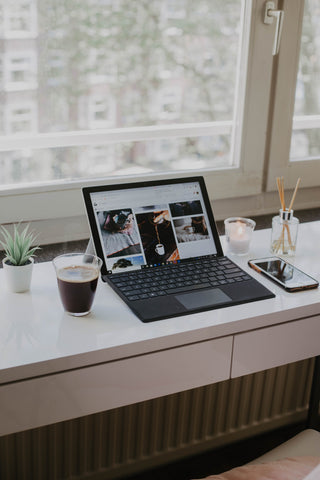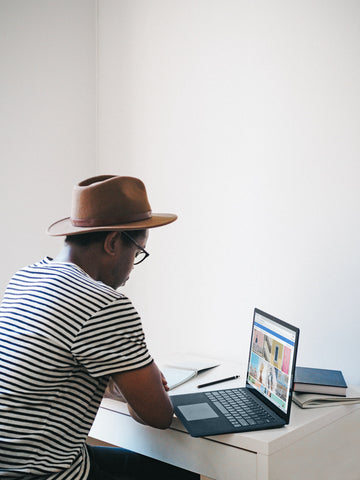Your Cart is Empty
- Shop
- About
- Learn
- Free Domestic Shipping Over $50
- +1(800)929-8935
- Login
- Free Domestic Shipping Over $50
- +1(800)929-8935

COVID-19 has thrown 1 in 5 Americans into a work-from-home situation¹. In a matter of days, thousands of people went from cubicles and city offices to frantically searching for their ethernet cables and dusting off their old webcams.
While working from home might seem like a dream at first, it can be a difficult transition if you're not prepared. Working from home sounds easy. After all, you can work all day in your pajamas, and you're only a minute's walk from the fridge. Contrary to what you might initially think, working from your house can make it more challenging to balance your work with your home life.
This major shift in your daily routine causes a ripple effect that spreads out through each of the eight dimensions of wellness.
 Working from home eliminates a lot of your daily movement. No more walking to the bus stop, dashing down the hallway to a conference call, or even going on that mid-morning coffee run. You may not realize it, but you probably move around quite a bit just going to and from work. Now that you're staying home all day, you may notice your exercise levels diminish.
Working from home eliminates a lot of your daily movement. No more walking to the bus stop, dashing down the hallway to a conference call, or even going on that mid-morning coffee run. You may not realize it, but you probably move around quite a bit just going to and from work. Now that you're staying home all day, you may notice your exercise levels diminish.
Exercise is a crucial component of your overall wellness. Even moderate exercise has lifelong benefits such as lower blood pressure, healthier weight, and a lower risk of diabetes and heart disease.
Find things at home that you can easily fit into your schedule and pepper small bouts of activity throughout your workday. One benefit of working from home is that the ten-minute coffee break. What you usually spend standing at the water cooler can now be enjoyed outside in your garden (and according to the American Heart Association, gardening counts as moderate exercise!)².
 Remote work can be very taxing on your emotions. Once the initial shock of the sudden switch wears off, remote employees are at an increased risk of stress and negativity³.
Remote work can be very taxing on your emotions. Once the initial shock of the sudden switch wears off, remote employees are at an increased risk of stress and negativity³.
It can be challenging to "turn off" when you work from home. After all, your work computer is sitting right there. You heard the email notification. So what if it's already six-thirty in the evening? You could just check your inbox quickly.
It is a dangerous line of thinking. You might also catch yourself saying, "I know it's almost five, but I can still finish this work later in the evening." It's effortless to lose track of how much work you're doing. Sometimes supervisors are also unaware of how much work they're assigning. Without careful planning and scheduling, remote work can quickly turn from a nine to five job to non-stop work.
Recognize the signs of stress from overwork.
Have an honest conversation with your supervisor or coworkers if you can, and set out reasonable and realistic work goals. Be open about your responsibilities at home and how much work you can realistically take on. You may also benefit from a more structured work schedule.
Communicate with your housemates, as well. Ensure everyone you live with understands that when you are working from home, you are genuinely working. Do not let your family treat you like you are at home on vacation.
 Your finances may seem like they've taken over your life, but it's essential to maintain perspective and balance. Money isn't everything, but you do need stable finances to live, and remote working is a part of that.
Your finances may seem like they've taken over your life, but it's essential to maintain perspective and balance. Money isn't everything, but you do need stable finances to live, and remote working is a part of that.
Focus on what you can control and let go of the rest. The economy is outside of your control. Your spending habits are not. Do what you can to protect your finances, but don't spend your evenings worrying over things you can't change.
It probably sounds like a tall order, yet there are proven methods to ease chronic worry⁴. Don't be afraid to speak to a professional about your concerns if you find your financial stress is affecting your life.
 Being isolated from friends and family is never easy. While technologies like Zoom, Skype, and even the good old-fashioned phone calls can fill some of the void, they're not a full replacement to actual face-to-face interaction.
Being isolated from friends and family is never easy. While technologies like Zoom, Skype, and even the good old-fashioned phone calls can fill some of the void, they're not a full replacement to actual face-to-face interaction.
Virtual communications are much more taxing on the brain than in-person encounters, and they're less socially satisfying, as well⁵.
It's not just your loved ones that you may be missing. Admit it or not, you miss your annoying coworkers and maybe, even your boss. Humans crave social interaction. We're used to seeing each other daily, whether it's a planned date or just passing by one another at the coffee shop.
Being isolated limits your social group. Every relationship is essential to your social wellbeing, even the small ones. Now that things have moved predominantly online, you've probably been cut off from a good chunk of your "sometimes" friends. The people you chat with when you bump into one another but aren't the kind of friends who'll call you up during a pandemic.
Reach out to people you may not have otherwise called, all those acquaintances, and "work friends" you usually only see.
Make sure you're dedicating your full attention to the people you call. It's better to have fewer meaningful conversations than a whole bunch of distracted ones. You'll make a deeper connection and maintain better social health this way.
 Typically we speak about occupational wellbeing in terms of finding the career path that most positively impacts your life. Right now, you're probably more concerned with keeping the job you have and emerging on the other side of this disaster relatively unscathed.
Typically we speak about occupational wellbeing in terms of finding the career path that most positively impacts your life. Right now, you're probably more concerned with keeping the job you have and emerging on the other side of this disaster relatively unscathed.
For most of us, our careers define part of who we are, and failing to complete your work responsibilities can feel like failing at being who you need to be.
Realize that your work goals and priorities may need to shift. Working from home, you won't have access to the same resources you would typically. Meaning, you may not be able to complete tasks efficiently or with the same degree of quality.
Raise any concerns you have with your team members or boss, and be sure to give yourself a break now and then. Focus on tasks you can accomplish well from home and celebrate your work accomplishments, no matter how small they seem.
 Your environment has a significant impact on how you feel. Psychologists have long studied stimulation theories to explain how and why people develop such strong feelings towards specific situations⁶. Your brain responds to environments that it recognizes. You probably have places where you feel very productive or locations that make you nervous.
Your environment has a significant impact on how you feel. Psychologists have long studied stimulation theories to explain how and why people develop such strong feelings towards specific situations⁶. Your brain responds to environments that it recognizes. You probably have places where you feel very productive or locations that make you nervous.
Unfortunately, COVID-19 has thrown a lot of our environments out of whack. Suddenly you're no longer going into the office, and instead, you're trying to answer relevant emails at the kitchen table. People are creating makeshift offices in their living rooms and moving temporary filing cabinets into their closets.
Unfortunately, many people have fallen into the habit of bringing their work laptops into bed with them.
The Division of Sleep Medicine at Harvard puts it simply: "Keep work materials out of the bedroom⁷." Once you start bringing those business reports and client phone calls into your bedroom, your brain begins to make associations between your room and work. Soon the sight of your bed will trigger not relaxation at the end of a long day but stress and worry over assignments and office place drama.
Build a dedicated home office. It doesn't have to be fancy, but it should be a work-only area that's as far from your bedroom as possible. Don't neglect the auditory elements of your environment, either. Noise from traffic, airplanes, or even the most well-meaning family members can be inordinately distracting.
 With all that's going on, you're probably finding it hard to focus on yourself. All your learning goals are perhaps on the back burner. When you're just trying to keep your head above water, how can you even think about moving forward?
With all that's going on, you're probably finding it hard to focus on yourself. All your learning goals are perhaps on the back burner. When you're just trying to keep your head above water, how can you even think about moving forward?
The answer is to adapt. Thousands of people are quickly trying to learn a whole new skill set to work from home efficiently. Identify some additional skills you'd like to possess that apply directly to your current work situation and set about mastering them. These could be technical skills, time management skills, or anything else relevant to working remotely. You'll be forwarding your career and making your current workload more bearable.
 Your spiritual wellness is very closely related to your emotions. If you are not at peace with yourself, then your other areas of wellness will suffer. Spiritual wellness is the lynchpin that holds everything together. Yet, it's the dimension of wellness that gets the least amount of attention.
Your spiritual wellness is very closely related to your emotions. If you are not at peace with yourself, then your other areas of wellness will suffer. Spiritual wellness is the lynchpin that holds everything together. Yet, it's the dimension of wellness that gets the least amount of attention.
It's a turbulent and emotional time right now. Many of your life's spiritual pillars are probably unavailable, whether that's church gatherings or just your sense of community.
Reflect. Tune into your emotions, needs, and desires. Set aside a few minutes each day for self-care.
Find things that ground you to the earth and life. Whether you meditate, journal, or simply get out and enjoy nature, be sure to take a little time away from the computer to know yourself better.
Striking a healthy work-life balance is tricky at the best of times. Now with everything so uncertain, it's more important than ever to pay close attention to each area of wellness. Working from home will likely not be permanent. Adjusting during this period will determine how quickly you can get back on your feet when things are more regular.
(1) Duffin, E (June 2020) Work situation of adults in the United States during the COVID-19 outbreak as of April 2020
(2) American Heart Association ( June 2018) American Heart Association Recommendations for Physical Activity in Adults and Kids
(3) Murphy, M (April 2020) Three Warning Signs That Your Remote Employees Are Starting To Crack Under The Stress Of Working From Home
(4) Mann, D (January 2008) 9 Steps to End Chronic Worrying
(5) Sklar, J (April 2020) ‘Zoom fatigue’ is taxing the brain. Here's why that happens
(6) McCunn, LJ (January 2015) Environmental Stimulation and Environmental Psychology
(7) Division of Sleep Medicine at Harvard Medical School (December 2007) Twelve Simple Tips to Improve Your Sleep